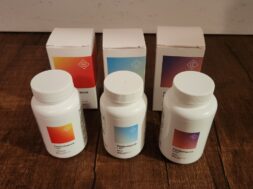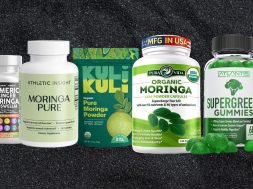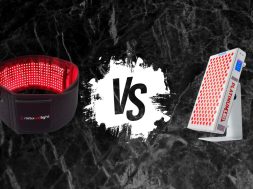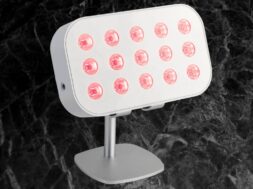
Are you looking for a game-changer in the world of dietary supplements? I’ve got the scoop on Performance Lab, a brand that’s been making waves with its promise of clean, high-quality, and effective products.
Pros
- Diverse Product Range: Offers various supplements for different health needs, including cognitive function and athletic performance.
- High Production Standards: Manufactured in FDA-registered, CGMP-certified facilities in the US.
- Focus on Safety and Purity: Free from artificial colors, preservatives, additives, and common allergens; organic, vegan, non-irradiated, and non-GMO ingredients.
- Transparency: Detailed labeling of ingredient dosages and forms.
- Stimulant and Non-Stim Options: Includes stimulant and non-stim health and wellness supplements.
Cons
- Limited Physical Availability: Products are not sold in physical stores; they are only available online.
- Individual Variability: Results may vary depending on your health status and lifestyle.
- Underdosing Of Some Ingredients: Some ingredients in certain formulas are underdosed, potentially not giving you the full benefits.
- Cost: Premium ingredients and formulations might make these supplements more expensive compared to some alternatives
Quick Verdict
Performance Lab have a range of supplements to enhance performance, brain function, and improve overall wellness.
However, our #1 nootropic of choice is Mind Lab Pro. It’s designed for long-term brain changes, not short-term boosts in mental performance.
Who Is Performance Lab?
Performance Lab is a UK-based company, the Performance Lab Group, known for developing innovative and effective supplements focusing on cognitive enhancement and overall health.
The company’s research and development team, consisting of neuroscientists, plays a crucial role in creating these supplements.
Their products are manufactured in a state-of-the-art, FDA-registered, CGMP-certified facility in the United States, ensuring high-quality production standards??.
Performance Lab offers a diverse range of supplements catering to various health needs. Their products are known for containing patented, clinically proven ingredients.
They avoid the use of artificial colors, preservatives, additives, or common allergens, and all their ingredients are organic, vegan, non-irradiated, and non-GMO.
Performance Lab
Performance Lab Supplement Range
Boost brain power, physical performance, energy, and overall wellness with the Performance Lab stack.
CHECK CURRENT DEALSPerformance Lab Review
Performance Lab Caffeine+

| Ingredients | Dose |
|---|---|
| Natural Caffeine | 50 mg |
| L-Theanine | 100 mg |
| L-Tyrosine | 250 mg |
In my experience, this is the most effective Performance Lab product.
Why?
Because it has the ultimate nootropic pairing of caffeine and L-theanine. Caffeine is well-known for enhancing performance by promoting focus and alertness.
On the other hand, L-theanine has the opposite effect, reducing stress and anxiety and resulting in relaxation [1].
This sounds like they cancel each other out. However, when combined with caffeine, there is a synergistic effect in which caffeine enhances alertness and focus while reducing jitteriness or anxiety [2].
Caffeine L-theanine stack, for example, has been found to improve visual processing speed, working memory, and computer-based reaction time [3]. Surprisingly, L-theanine increased reaction time on its own.
Increases in attentiveness were also observed, as were decreases in tiredness and mental weariness.
Even small doses of L-theanine (100 mg) and caffeine (50 mg) have been shown to improve reaction times and accuracy [4].
This improvement was larger than in the caffeine-only group. Finally, even low doses of 97 mg L-Theanine and 40 mg caffeine increased task-switching accuracy, alertness, and fatigue reduction [5].
This is comparable to Performance Lab, which contains 100 mg L-Theanine and 50 mg caffeine. This 2:1 ratio appears to be the optimal concentration ratio.
The last ingredient is L-tyrosine, known for its brain-boosting power. It has demonstrated increased dopamine levels in the brain. L-tyrosine supplementation has enhanced cognitive regulation, especially in mentally taxing environments [6].
It is particularly beneficial for enhancing cognitive flexibility, a function influenced by dopamine.
Although the potential of L-Tyrosine to address clinical issues and enhance physical activity is restricted, it does prove beneficial in circumstances that require cognitive effort or tension.
When neurotransmitter activity is unaltered, but dopamine and norepinephrine levels are momentarily reduced, it produces the most significant cognitive benefits [7].
According to research, the optimal doses for cognitive enhancement commence at a minimum of 2 grams. That is 8 times the dosage in Performance Lab Caffeine+.
However, most of the benefits are derived from the caffeine L-theanine stack.
Performance Lab Energy
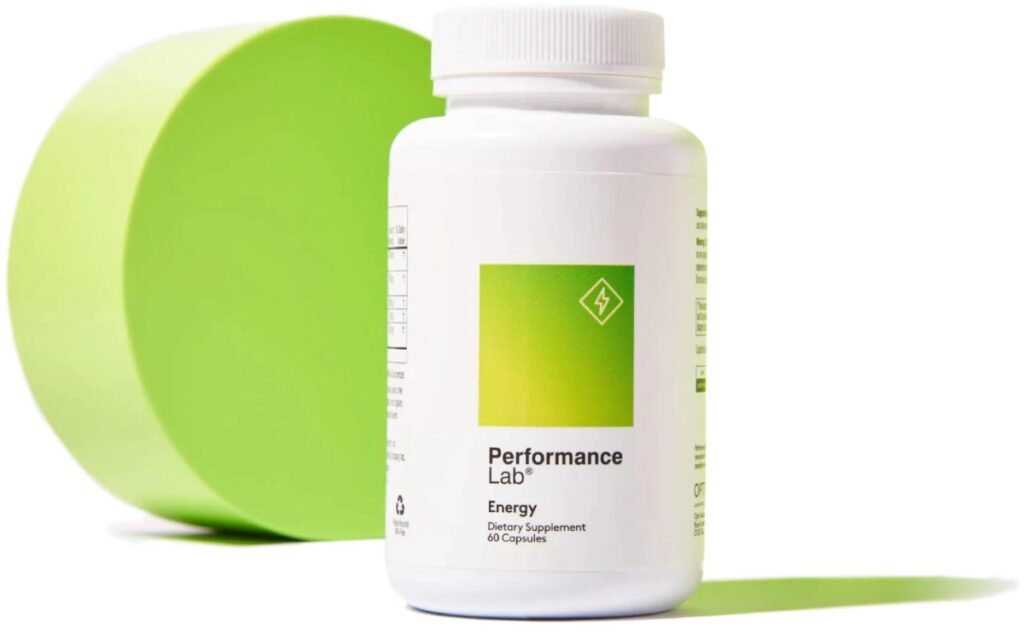
| Ingredients | Dose |
|---|---|
| Magnesium | 60 mg |
| L-Carnitine | 500 mg |
| R-Lipoic Acid | 100 mg |
| Coenzyme Q10 | 100 mg |
| BioPQQ | 10 mg |
| BioPerine | 2.5 mg |
The ingredients list to provide energy is interesting. I’m not sure why it doesn’t contain caffeine, as that is the ultimate nootropic energy booster. But I digress.
Magnesium is required for brain activities and has been studied for possible cognitive advantages. It is very effective at raising magnesium levels in the brain and has shown promise in improving memory and cognition in healthy adults [8].
Although research suggests that magnesium may help lower depressive symptoms, the findings are not consistent across all mental health disorders [9].
More study is required to establish magnesium’s efficacy and suitable use as a therapeutic supplement in a variety of psychiatric and cognitive problems [10].
If you lack magnesium, 60 mg is a very small dose, and there is no apparent benefit to giving you more energy.
L-carnitine is not an amino acid known for giving energy. It may help with weight loss in some circumstances and can potentially reduce depressive symptoms [11][12].
I suspect R-lipoic acid was added because of old rodent studies. This indicates that R-lipoic acid improved mitochondrial function decreased oxidative damage, and increased metabolic rate [13].
However, animal studies don’t translate to humans, and I haven’t seen any data relating to human benefits when supplementing with R-lipoic acid.
Coenzyme Q10 (CoQ10) isn’t known as an energy-boosting supplement either and instead has been researched for its potential benefits in reducing chronic inflammation – a factor in metabolic diseases.
Studies show CoQ10 can significantly decrease inflammatory markers and may improve endothelial function in cardiovascular patients, enhancing flow-mediated dilatation [14][15][16][17].
However, effects vary, and further research is needed to confirm these findings and determine optimal dosages.
Pyrroloquinoline quinone (PQQ) is involved in essential biological processes like mitochondriogenesis, growth, and aging.
Its absence in diets can lead to vitamin-like deficiency symptoms, which can be reversed with PQQ.
PQQ is mainly known for improving mitochondrial function and promoting metabolic flexibility, immunity, and neuroprotection [18].
Additionally, a clinical study found that daily supplementation with PQQ significantly improved vigor, fatigue, mood, quality of life, and sleep in adults [19].
However, this was with a 20 mg dose, double that of Performance Lab Energy. Finally, Bioperine is a proprietary and trademarked ingredient that claims to boost nutritional absorption [20]. It’s debatable whether the effect is significant.
Performance Lab Energy claims it helps “restore malfunctioning mitochondria.” Every athlete would take this if these ingredients were effective, so I’m not sold.
Performance Lab Flex

| Ingredients | Dose |
|---|---|
| Turmeric | 250 mg |
| AprèsFlex® Boswellia serrata | 100 mg |
| Glucosamine Sulfate | 500 mg |
| Phytodroitin | 100 mg |
| OptiMSM | 100 mg |
Performance Lab Flex is their signature joint health supplement. However, the evidence is not strong for their first ingredient turmeric. It’s been marketed over the past decade as an anti-inflammatory joint supplement.
Reviews of randomized clinical trials (RCTs) suggest that turmeric extracts (about 1000 mg/day of curcumin) can potentially alleviate arthritis symptoms. However, the quality of these studies is not sufficient to draw specific conclusions [21].
In people with chronic inflammatory diseases, turmeric or curcumin hasn’t significantly reduced inflammatory markers [22].
Further, turmeric extracts have shown effectiveness in reducing knee pain and improving physical function in knee osteoarthritis patients, comparable to NSAIDs but with fewer adverse events [23].
The 250 mg dose may give you this effect since doses between 80 and 2000 mg have been used within the research. However, 1000 mg daily didn’t relieve arthritis symptoms.
Boswellia serrata is known for its anti-inflammatory properties and is considered beneficial for osteoarthritis treatment.
Meta-analysis of seven trials involving 545 patients indicates that Boswellia and its extracts may effectively relieve pain, reduce stiffness, and improve joint function in osteoarthritis patients [24].
Compared to placebo, Boswellia significantly reduces pain and stiffness while improving joint functionality, especially when combined with curcumin (as in Performance Lab Flex) [25].
It’s suggested as a safe and effective option for osteoarthritis management, with a recommended treatment duration of at least 4 weeks. However, larger and more comprehensive studies are necessary to confirm these findings fully [26].
100-250 mg of Boswellia was used in these studies, suggesting Performance Lab Flex may provide these benefits.
Glucosamine sulfate is a popular supplement for knee osteoarthritis, believed to help with joint pain and cartilage health.
Research shows that it can marginally reduce pain, though its effect on knee function is small and not consistently significant [27][28][29].
Additionally, glucosamine is found to be safe with mild and transient side effects.
However, the overall effectiveness of glucosamine in osteoarthritis treatment, particularly for long-term joint preservation and function improvement, still requires further investigation [26].
There’s little research on Phytodroitin (mucopolysaccharide extract), and one review paper shows it to be more effective for Achilles tendinopathy than doing nothing and slightly better than acupuncture when Phytodroitin is paired with exercise treatment [30].
However, the lone study this review cited found passive stretching + mucopolysaccharide extract was as effective as an eccentric exercise intervention for Achilles tendinopathy pain, which is essentially saying mucopolysaccharide extract is as effective as eccentric training [31].
This is a laughable conclusion from a supplement study.
MSM is another popular joint supplement with little research backing it, as current evidence on its effectiveness is inconclusive.
Studies show a non-significant reduction in pain with MSM use, indicating that it may not be clinically effective in reducing osteoarthritis-related pain [32].
More robust research is needed to determine MSM’s efficacy in OA treatment, as existing studies have mixed findings and limited sample sizes [26].
Performance Lab Flex is built on speculative ingredients that may not give you the necessary joint relief.
Performance Lab Prebiotic

| Ingredients | Dose |
|---|---|
| Orafti® Synergy1 | 2 g |
Chicory-derived inulin-type fructans, like Orafti® Synergy1, have been shown to significantly increase the abundance of Bifidobacterium in the gut [33].
This effect is observed in individuals of various ages, from 0 to 83 years, and applies to healthy individuals and those with specific health impairments.
However, it doesn’t seem to benefit those with gastrointestinal disorders. These fructans, at doses of 3–20g/day, also positively impact bowel function in healthy subjects.
As Performance Lab Prebiotic is dosed at 2 g, it may not give improved gut health as shown within the research.
Performance Lab Immune

| Ingredients | Dose |
|---|---|
| Lactococcus lactis strain plasma | 36 mg |
| Setria® Glutathione | 250 mg |
Very few supplements do much in the immunity space. Lactococcus lactis strain plasma (LC-Plasma) is known for its anti-viral effects.
Studies have shown that 50 mg LC-Plasma can reduce school absenteeism in children due to respiratory and gastrointestinal illnesses [34].
It also seems to improve general well-being. In athletes, the same dose of LC-Plasma in Performance Lab Immune is associated with reduced symptoms and frequency of upper respiratory tract infections and decreased fatigue during high-intensity exercise [35].
I could not find any research relating to glutathione and its effects on health and immunity. However, lactococcus lactis strain plasma shows promise as an effective immune supplement.
Performance Lab Mind
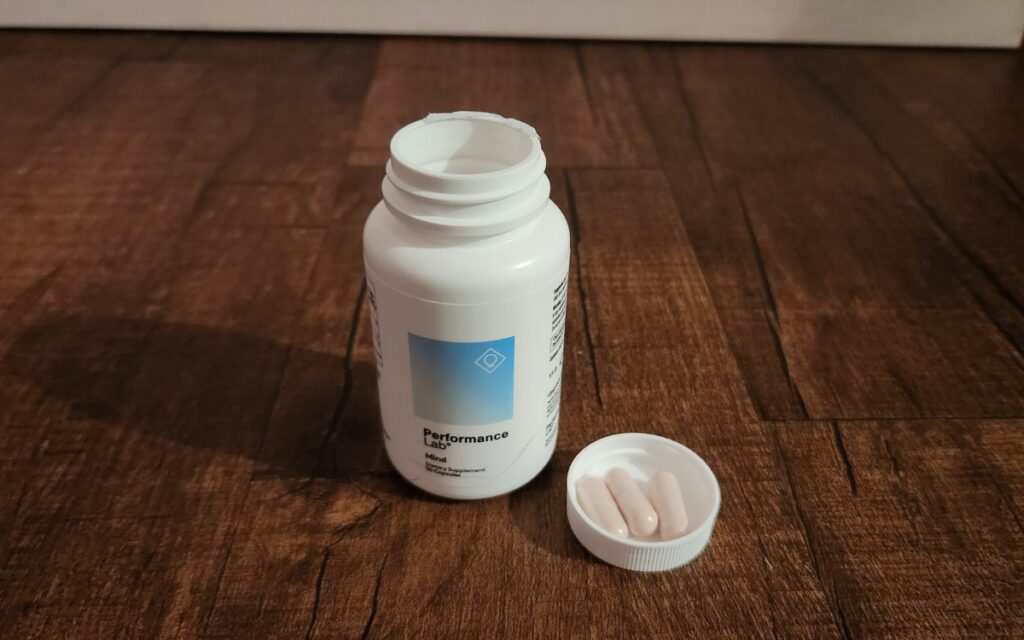
| Ingredients | Dose |
|---|---|
| Citicoline | 250 mg |
| Phosphatidylserine | 100 mg |
| L-Tyrosine | 250 mg |
| Maritime Pine Bark Extract | 75 mg |
Unfortunately, Performance Lab Mind is a watered-down version of Mind Lab Pro. So, if you’re looking for cognitive enhancement, see our Mind Lab Pro review.
Citicoline is frequently brought up in conversations concerning memory enhancement. According to research, 500 mg daily may increase episodic memory or the ability to recall personal experiences and specific events, particularly in older persons [36].
Other research suggests that ingesting at least 500 mg of this drug daily may provide cognitive benefits to healthy people [37].
The formulation of Performance Lab Mind contains 250 mg of citicoline. This dose may not achieve the full potential seen in research advocating a double dose.
Phosphatidylserine (100-300 mg daily) improves memory in elderly persons with cognitive deterioration [38].
Studies have shown that it can help people suffering from neurodegenerative disorders [39].
Performance Lab Mind contains 100 mg of phosphatidylserine, which may benefit you. However, healthy people are unlikely to be affected.
L-tyrosine is noteworthy for its ability to improve cognitive flexibility, making task switching easier [40].
It shines most while transitioning between tasks or under extreme stress [41].
Doses of 2 grams or higher have been demonstrated to improve mental functioning. The 250 mg dosage of L-Tyrosine may fall short of the effective range.
Finally, Pycnogenol, or Maritime Pine Bark Extract, is a potent antioxidant. Does it improve cognitive function?
Preliminary research points to a yes for the elderly, students, and professionals, with implications for the mind and memory [42]. It may also aid in treating traumatic brain injury [43].
Regardless, Mind Lab Pro is a better alternative to Performance Lab Mind.
Performance Lab Vision

| Ingredients | Dose |
|---|---|
| European Freeze-Dried Blackcurrant | 300 mg |
| European Blackcurrant Extract | 25 mg |
| European Bilberry Extract | 25 mg |
| Lutein | 10 mg |
| Zeaxanthin | 2 mg |
| Astaxanthin | 4 mg |
| Saffron | 10 mg |
Black currant and bilberry extract containing anthocyanins show promise in improving vision and eye health.
Studies indicate it can significantly improve contrast sensitivity and reduce symptoms in individuals using screens [44].
It may also help lower intraocular pressure in healthy individuals and glaucoma patients [45].
These benefits occur without significant changes in systemic blood pressure or pulse rates, suggesting black currant extract is a potentially safe and effective option for supporting eye health and managing conditions like glaucoma.
Lutein and zeaxanthin are carotenoids found in the eye and are linked to improved visual function in age-related macular degeneration patients [46].
Supplementation with these nutrients has shown benefits in visual acuity, contrast sensitivity, and reducing glare recovery time.
Additionally, lutein alone can enhance macular pigment optical density and visual acuity [47].
These findings suggest that lutein and zeaxanthin effectively support eye health, particularly in age-related macular degeneration, but further research is needed for conclusive evidence.
Astaxanthin is a red carotenoid pigment found in marine environments and shows promise in treating various eye conditions due to its antioxidant, anti-inflammatory, and antiapoptotic properties.
It has been studied for potential benefits in retinal diseases, ocular surface disorders, uveitis, cataracts, and asthenopia [48].
A study on middle-aged and elderly patients with mild-to-moderate dry eye disease demonstrated that oral astaxanthin significantly improved symptoms and signs of dry eye disease, making it a potential therapeutic option for ocular health [49].
Further research is needed to establish optimal dosages and administration methods.
Finally, saffron is known for its antioxidant carotenoids, crocin, and crocetin, and it shows potential in treating eye disorders like age-related macular degeneration [50].
Clinical studies have reported improved visual acuity, contrast sensitivity, and macular thickness after saffron supplementation [51].
For glaucoma, saffron reduces intraocular pressure. In diabetic maculopathy, crocin supplementation improved central macular thickness and visual acuity [52].
These benefits are attributed to saffron’s neuroprotective and antioxidative properties, suggesting it is a promising supplement for various eye conditions.
Performance Lab Vision has the most positive evidence for its ingredients, suggesting it may potentially help with deteriorating vision.
Performance Lab Sleep
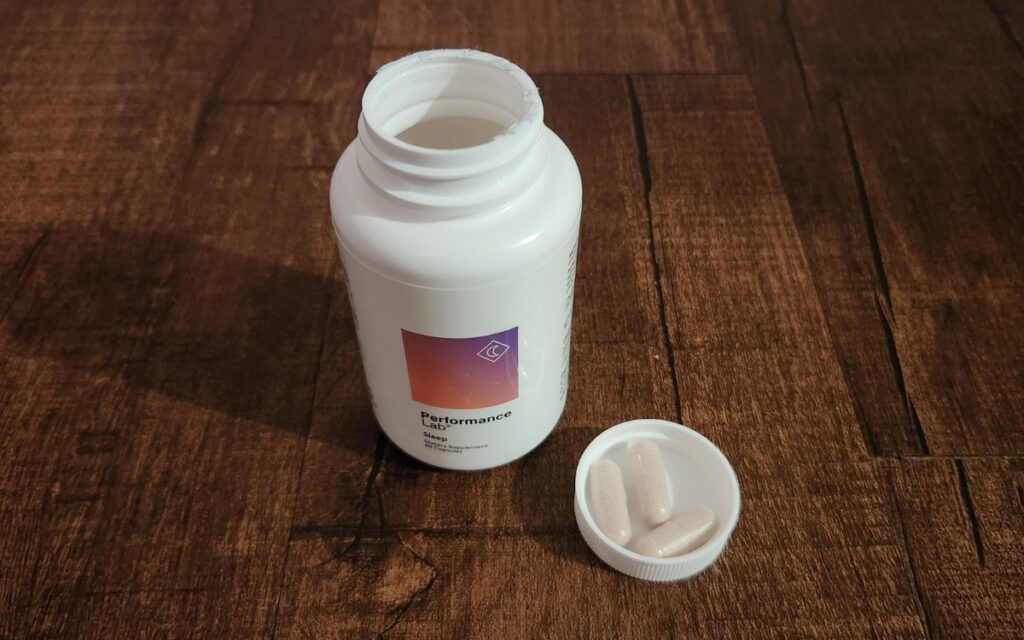
| Ingredients | Dose |
|---|---|
| Magnesium | 100 mg |
| CherryPURE® | 500 mg |
| L-Tryptophan | 250 mg |
| Organic Sea Buckthorn | 100 mg |
Sleep supplements have boomed in the modern era with the increasingly busy and stimulating lifestyles. Most are melatonin-based. However, you may want to skip melatonin if it makes you groggy.
Performance Lab Sleep is a melatonin-free sleep supplement. Magnesium supplementation is investigated for its potential to improve sleep, particularly in older adults with insomnia [53].
Studies show that magnesium might reduce sleep onset latency, but results on total sleep time are inconclusive [54].
While current research suggests possible benefits, the evidence remains limited in quality, making it challenging for healthcare providers to make definitive recommendations [55][56].
Oral magnesium is affordable and accessible, and while some trials suggest benefits for insomnia symptoms, more rigorous, long-term studies are needed for clearer guidance.
Tart cherry extract may positively impact sleep. Studies indicate it can objectively improve total sleep time and efficiency, though subjective improvements in sleep perception among insomniacs are less clear [57].
The effective dosage in studies typically comes from about 100g of cherries. While the exact mechanism of tart cherry’s sleep benefits remains unclear, increases in melatonin metabolites have been noted.
More research is needed to understand its potential as a sleep aid in different settings, including hospitals, and to assess long-term effects and tolerance development.
L-tryptophan is a natural amino acid known to aid in sleep improvement. It acts as a precursor to serotonin, a neurotransmitter that influences sleep.
Studies show that tryptophan supplementation positively impacts sleep maintenance, reducing wake time after sleep onset and increasing sleep efficiency [58].
Doses of 1g or more seem more effective, particularly in people with insomnia. Unfortunately, Performance Lab Sleep only contains 250 mg.
Tryptophan may also affect sleep architecture, potentially increasing the restorative NREM sleep phase.
However, its exact mechanisms and optimal dosing require further research. This supplement is considered especially beneficial for individuals with mild to moderate insomnia.
Limited information is available regarding using Sea Buckthorn as a sleep improvement supplement.
Sea Buckthorn is known for its rich nutritional content, including vitamins, minerals, and antioxidants, but its direct effects on sleep have not been extensively studied or documented.
Performance Lab Sleep may help you sleep better, although you may not “feel” it.
Performance Lab Omega 3

| Ingredients | Dose |
|---|---|
| Algal Oil | 1800 mg |
| Total Omega-3 Fatty Acids | 990 mg |
| DHA | 540 mg |
| EPA | 270 mg |
Fish oil supplements are rich in omega-3 fatty acids and are studied for various health benefits.
They have been associated with a lower risk of metabolic syndrome and benefits in chronic diseases like cardiovascular disease, type 2 diabetes, and certain cancers.
Recent research on CVD indicates that while omega-3 fatty acids may not significantly impact major cardiovascular events, they could reduce cardiovascular mortality and the need for revascularization [59].
The evidence is mixed regarding their effect on insulin sensitivity, with potential benefits in metabolic disorders [60].
In weight management, fish oil might aid in reducing abdominal fat when combined with lifestyle changes, though its overall effect on weight loss is unclear [61].
Additionally, fish oil could alleviate post-exercise muscle soreness and aid in athletic performance and recovery [62].
The recommended daily dosage ranges from 1.1 g to 7 g, which benefits both athletes and non-athletes in improving muscle soreness and reducing inflammation.
My rule when choosing fish oil is to have the EPA/DHA content as close to the total capsule size as possible; otherwise, you’re getting filler oil.
Performance Lab Omega 3 is 50% EPA/DHA to the total serving size. There are more potent fish oils available.
Performance Lab Vitamin D3 + K2

| Ingredients | Dose |
|---|---|
| Vitamin D3 | 1000 IU |
| Total Omega-3 Fatty Acids | 2000 IU |
The combined use of vitamins K2 and D3 shows promising effects in improving bone health, particularly in postmenopausal women with osteopenia and osteoporosis.
Research indicates that this combination significantly enhances vertebral bone mineral density over 24 months more effectively than vitamin alone [63].
Additionally, this therapy stimulates bone formation and resorption activity, maintaining balance in the fibrinolysis-coagulation system without adverse reactions [64].
Overall, supplementing with vitamins K and D can considerably increase total bone mineral density and decrease undercarboxylated osteocalcin, a marker of bone health.
Price
| Product | 1-Month Supply | 2-Months Supply | 4-Months Supply |
|---|---|---|---|
| Performance Lab Caffeine+ | $44.00 ($1.47/serving) | $88.00 ($1.47/serving) | $132.00 ($1.10/serving) |
| Performance Lab Energy | $69.00 ($2.30/serving) | $138.00 ($2.30/serving) | $207.00 ($1.73/serving) |
| Performance Lab Flex | $49.00 ($1.63/serving) | $98.00 ($1.63/serving) | $147.00 ($1.23/serving) |
| Performance Lab Prebiotic | $44.00 ($1.47/serving) | $88.00 ($1.47/serving) | $132.00 ($1.10/serving) |
| Performance Lab Immune | $34.00 ($1.13/serving) | $68.00 ($1.13/serving) | $102.00 ($0.85/serving) |
| Performance Lab Mind | $59.00 ($1.97/serving) | $118.00 ($1.97/serving) | $177.00 ($1.48/serving) |
| Performance Lab Vision | $49.00 ($1.63/serving) | $98.00 ($1.63/serving) | $147.00 ($1.23/serving) |
| Performance Lab Sleep | $44.00 ($1.47/serving) | $88.00 ($1.47/serving) | $132.00 ($1.10/serving) |
| Performance Lab Omega 3 | $49.00 ($1.63/serving) | $98.00 ($1.63/serving) | $147.00 ($1.23/serving) |
| Performance Lab Vitamin D3 + K2 | $29.00 ($0.97/serving) | $58.00 ($0.97/serving) | $87.00 ($0.73/serving) |
Benefits of Performance Lab
Multiple Options For Different Needs
Performance Lab offers various supplements to cater to multiple health and wellness goals.
There are tailored options, whether it’s for improving vision, sleep, enhanced physical performance, or improved mental clarity.
This variety ensures that individuals can find a supplement that aligns closely with their specific needs.
Stimulant & Non-Stimulant Options
The range includes both stimulant and non-stimulant formulations.
This benefits those sensitive to stimulants or seeking a non-jittery, calm focus. It allows users to choose products that match their tolerance levels and preferences.
Non-stimulant options mean you can take the supplement anytime without disturbing your sleep.
Potentially Enhance Cognitive Function
Some supplements in the Performance Lab range are designed to potentially enhance cognitive functions.
These products focus on improving concentration, memory, and overall brain health, using ingredients backed by scientific research. This makes them suitable for individuals aiming to boost their mental performance.
Who Is Performance Lab For?
Health-Conscious Individuals
Performance Lab is ideal for those who prioritize their health and wellness. It offers supplements that support overall well-being, making it suitable for health-conscious individuals.
You have choices for improving sleep, vision, energy, and even gut health.
Biohackers
Biohackers always seek the next best supplement to improve their health and mental performance. They are in tune with their bodies and can determine whether a supplement works for them through experimentation.
Professionals and Students
The range is also tailored for professionals and students seeking cognitive enhancements, such as improved focus and memory, to aid their work or studies.
My Experience With Performance Lab
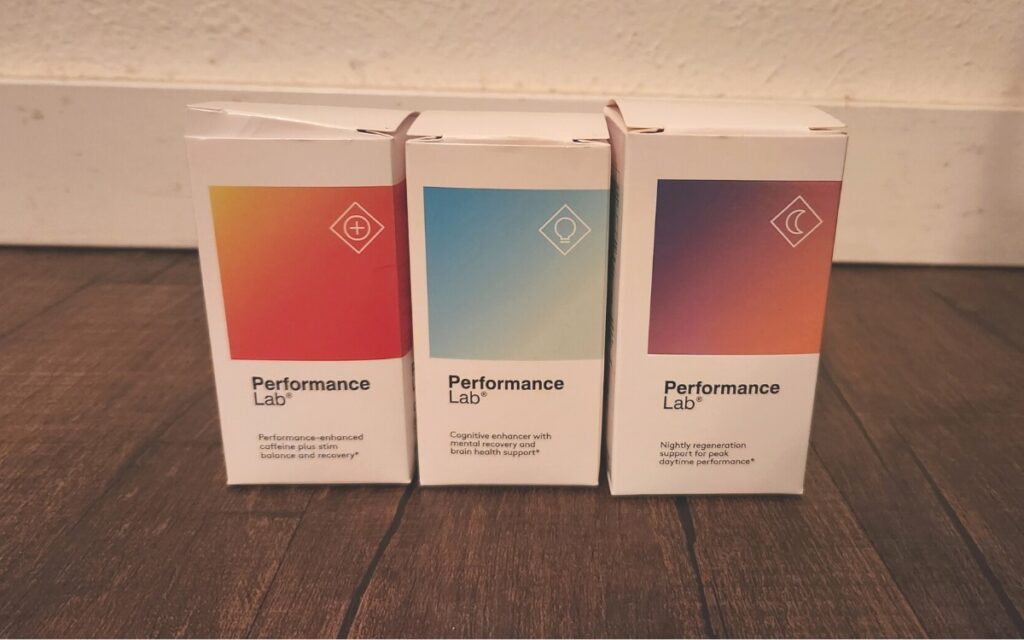
I’ve used Performance Lab Caffeine+, Mind, and Sleep. I was most impressed by Performance Lab Caffeine+. I still use it when I need a quick pick me up for a mentally demanding task like writing this review or podcasting.
It’s the one I highly recommend. Performance Lab Mind is a non-stimulant brain booster, but in my experience, it isn’t as powerful as Mind Lab Pro.
Finally, Performance Lab Sleep showed no noticeable improvements in my sleep. However, some ingredients may show objective sleep improvements without you noticing.
Regardless, there are benefits to some of Performance Labs supplement line. It’s worth trying for yourself.
User Reviews & Testimonials
The Performance Lab product line has a minimum of 4/5 star reviews. Here are some sample reviews of their products:
“One pill is all I need to get me through the day! It’s great getting my caffeine in a pill rather than an energy drink with additives.” – Desiree G.
“Very good, works very well for me, I feel awake and having “normal” brain function again.
I have stopped it for a while, but I ordered it again cause it really makes a difference. Without it, my brain is more tired and slower.” – Fanny C.
“I recommend this product and the company. I have restless legs and have had interrupted sleep and I find this product to be the best help.” – Katie D.
The negative reviews center around users not feeling it works.
Performance Lab Side Effects
Performance Lab supplements are generally considered safe with minimal risk of side effects due to their focus on natural and high-quality ingredients. I haven’t experienced any adverse effects with the three Performance Lab blends I took.
However, like all supplements, there is a potential for side effects, especially if taken in excess or alongside certain medications.
Consult with healthcare professionals before starting any new supplement regimen, particularly if they have pre-existing health conditions or are taking other medications.
Performance Lab Mind Alternatives
If you’ve gotten this far and aren’t sold on Performance Lab, here are some alternatives to try.
Nooceptin
It boosts memory and concentration while providing a long-lasting boost without the caffeine crash. Nooceptin should improve cognition in students, gamers, professionals, and elders.
Lion’s Mane Extract, Citicoline, Rhodiola Rosea Extract, L-Theanine, Bacopa Monnieri, Ginkgo Biloba, and Panax Ginseng are all included in this brain supplement.
Some of these substances have been demonstrated to be beneficial, while others still need more research. Nooceptin, a non-stimulant technique for long-term cognitive enhancement, usually takes 7-14 days to take effect.
Despite the risk of underdosing and the increased expense, Nooceptin may deliver a stimulant-free cognitive boost.
More information can be found in our Nooceptin review.
Vyvamind
The formulation of Vyvamind, which contains less L-tyrosine and citicoline than some studies suggest, is designed to supplement the key nootropic duo of caffeine and L-theanine.
This combination has long been used to improve concentration and cognitive performance. The supplement is marketed as a non-stimulant alternative, appealing to customers looking for a more natural, less intensive approach to cognitive development.
Vyvamind is appropriate for coffee-averse individuals, busy professionals needing a focus boost, and students during study sessions.
Our Vyvamind review has a comprehensive breakdown.
NooCube
The benefits to mental health from these are well-known. More research is needed to confirm the efficacy of some substances, like Huperzine-A and Alpha GPC.
The proportions of each ingredient are clearly indicated in NooCube, and its purpose is to enhance cognition and alertness without using stimulants.
Individuals in the working class, students, older people, gamers, and combat athletes can all benefit from NooCube’s cognitive enhancements without the jitteriness that caffeine does.
Read our NooCube review for all the details.
Frequently Asked Performance Lab Questions
Is Performance Lab Worth It?
Performance Lab’s worth depends on individual needs and expectations. Their products, designed for various health and wellness goals, might be valuable for those seeking high-quality, natural supplements.
I highly recommend Performance Lab Caffeine+ as the most worthwhile supplement for its immediate cognitive boosting effects. Performance Lab Vitamin D3 + K2 is also great for females, preventing bone loss.
Is Performance Lab A Good Company?
Performance Lab is generally regarded as reputable, focusing on natural and scientifically backed ingredients. They emphasize quality and purity in their products, which aligns with the preferences of health-conscious consumers.
However, some products are slightly underdosed with their ingredients, potentially not giving you the full benefits.
Is Performance Lab Third Party Tested?
Performance Lab states that their products undergo rigorous testing, including third-party verification. This ensures product quality, purity, and safety, aligning with industry standards for supplement manufacturing.
Conclusion
Performance Lab has an extensive range of supplements that may suit your needs. Based on my experience and the evidence, these are the ones I believe are most beneficial:
- Performance Lab Caffeine+
- Perforamance Lab Vision
- Performance Lab Sleep
- Performance Lab Omega 3
- Performance Lab Vitamin D3 + K2
Performance Lab
Performance Lab Supplement Range
Boost brain power, physical performance, energy, and overall wellness with the Performance Lab stack.
CHECK CURRENT DEALSReferences
- Lu, K., Gray, M. A., Oliver, C., Liley, D. T., Harrison, B. J., Bartholomeusz, C. F., … & Nathan, P. J. (2004). The acute effects of L?theanine in comparison with alprazolam on anticipatory anxiety in humans. Human Psychopharmacology: Clinical and Experimental, 19(7), 457-465
- Mason, R. (2001). 200 mg of Zen: L-theanine boosts alpha waves, promotes alert relaxation. Alternative & Complementary Therapies, 7(2), 91-95.
- Haskell, C. F., Kennedy, D. O., Milne, A. L., Wesnes, K. A., & Scholey, A. B. (2008). The effects of L-theanine, caffeine and their combination on cognition and mood. Biological psychology, 77(2), 113-122.
- Owen, G. N., Parnell, H., De Bruin, E. A., & Rycroft, J. A. (2008). The combined effects of L-theanine and caffeine on cognitive performance and mood. Nutritional neuroscience, 11(4), 193-198.
- Giesbrecht, T., Rycroft, J. A., Rowson, M. J., & De Bruin, E. A. (2010). The combination of L-theanine and caffeine improves cognitive performance and increases subjective alertness. Nutritional neuroscience, 13(6), 283-290.
- Steenbergen, L., Sellaro, R., Hommel, B., & Colzato, L. S. (2015). Tyrosine promotes cognitive flexibility: evidence from proactive vs. reactive control during task switching performance. Neuropsychologia, 69, 50-55.
- Jongkees, B. J., Hommel, B., Kühn, S., & Colzato, L. S. (2015). Effect of tyrosine supplementation on clinical and healthy populations under stress or cognitive demands—A review. Journal of psychiatric research, 70, 50-57.
- Zhang, C., Hu, Q., Li, S., Dai, F., Qian, W., Hewlings, S., … & Wang, Y. (2022). A Magtein®, Magnesium L-Threonate,-Based Formula Improves Brain Cognitive Functions in Healthy Chinese Adults. Nutrients, 14(24), 5235.
- Botturi, A., Ciappolino, V., Delvecchio, G., Boscutti, A., Viscardi, B., & Brambilla, P. (2020). The role and the effect of magnesium in mental disorders: a systematic review. Nutrients, 12(6), 1661.
- Phelan, D., Molero, P., Martinez-Gonzalez, M. A., & Molendijk, M. (2018). Magnesium and mood disorders: systematic review and meta-analysis. BJPsych open, 4(4), 167-179.
- Pooyandjoo, M., Nouhi, M., Shab?Bidar, S., Djafarian, K., & Olyaeemanesh, A. (2016). The effect of (L?) carnitine on weight loss in adults: a systematic review and meta?analysis of randomized controlled trials. Obesity reviews, 17(10), 970-976.
- Veronese, N., Stubbs, B., Solmi, M., Ajnakina, O., Carvalho, A. F., & Maggi, S. (2018). Acetyl-L-carnitine supplementation and the treatment of depressive symptoms: a systematic review and meta-analysis. Psychosomatic medicine, 80(2), 154-159.
- Hagen, T. M., Ingersoll, R. T., Lykkesfeldt, J., LIU, J., WEHR, C. M., VINARSKY, V., … & AMES, B. N. (1999). (R)???Lipoic acid?supplemented old rats have improved mitochondrial function, decreased oxidative damage, and increased metabolic rate. The FASEB journal, 13(2), 411-418.
- Zhai, J., Bo, Y., Lu, Y., Liu, C., & Zhang, L. (2017). Effects of coenzyme Q10 on markers of inflammation: a systematic review and meta-analysis. PloS one, 12(1), e0170172.
- Fan, L., Feng, Y., Chen, G. C., Qin, L. Q., Fu, C. L., & Chen, L. H. (2017). Effects of coenzyme Q10 supplementation on inflammatory markers: A systematic review and meta-analysis of randomized controlled trials. Pharmacological research, 119, 128-136.
- Akbari, A., Mobini, G. R., Agah, S., Morvaridzadeh, M., Omidi, A., Potter, E., … & Dehghani, S. (2020). Coenzyme Q10 supplementation and oxidative stress parameters: a systematic review and meta-analysis of clinical trials. European journal of clinical pharmacology, 76, 1483-1499.
- Gao, L., Mao, Q., Cao, J., Wang, Y., Zhou, X., & Fan, L. (2012). Effects of coenzyme Q10 on vascular endothelial function in humans: a meta-analysis of randomized controlled trials. Atherosclerosis, 221(2), 311-316.
- Jonscher, K. R., Chowanadisai, W., & Rucker, R. B. (2021). Pyrroloquinoline-quinone is more than an antioxidant: a vitamin-like accessory factor important in health and disease prevention. Biomolecules, 11(10), 1441.
- Nakano, M., Yamamoto, T., Okamura, H., Tsuda, A., & Kowatari, Y. (2012). Effects of oral supplementation with pyrroloquinoline quinone on stress, fatigue, and sleep. Functional foods in health and disease, 2(8), 307-324.
- Fernández-Lázaro, D., Mielgo-Ayuso, J., Córdova Martínez, A., & Seco-Calvo, J. (2020). Iron and physical activity: Bioavailability enhancers, properties of black pepper (bioperine®) and potential applications. Nutrients, 12(6), 1886.
- Daily, J. W., Yang, M., & Park, S. (2016). Efficacy of turmeric extracts and curcumin for alleviating the symptoms of joint arthritis: a systematic review and meta-analysis of randomized clinical trials. Journal of medicinal food, 19(8), 717-729.
- White, C. M., Pasupuleti, V., Roman, Y. M., Li, Y., & Hernandez, A. V. (2019). Oral turmeric/curcumin effects on inflammatory markers in chronic inflammatory diseases: a systematic review and meta-analysis of randomized controlled trials. Pharmacological research, 146, 104280.
- Wang, Z., Singh, A., Jones, G., Winzenberg, T., Ding, C., Chopra, A., … & Antony, B. (2021). Efficacy and safety of turmeric extracts for the treatment of knee osteoarthritis: a systematic review and meta-analysis of randomised controlled trials. Current Rheumatology Reports, 23(2), 1-11.
- Yu, G., Xiang, W., Zhang, T., Zeng, L., Yang, K., & Li, J. (2020). Effectiveness of Boswellia and Boswellia extract for osteoarthritis patients: a systematic review and meta-analysis. BMC complementary medicine and therapies, 20(1), 1-16.
- Bannuru, R. R., Osani, M. C., Al-Eid, F., & Wang, C. (2018, December). Efficacy of curcumin and Boswellia for knee osteoarthritis: systematic review and meta-analysis. In Seminars in arthritis and rheumatism (Vol. 48, No. 3, pp. 416-429). WB Saunders.
- Liu, X., Machado, G. C., Eyles, J. P., Ravi, V., & Hunter, D. J. (2017). Dietary supplements for treating osteoarthritis: a systematic review and meta-analysis. British journal of sports medicine.
- Simental-Mendia, M., Sanchez-Garcia, A., Vilchez-Cavazos, F., Acosta-Olivo, C. A., Pena-Martinez, V. M., & Simental-Mendia, L. E. (2018). Effect of glucosamine and chondroitin sulfate in symptomatic knee osteoarthritis: a systematic review and meta-analysis of randomized placebo-controlled trials. Rheumatology international, 38(8), 1413-1428.
- Ogata, T., Ideno, Y., Akai, M., Seichi, A., Hagino, H., Iwaya, T., … & Hayashi, K. (2018). Effects of glucosamine in patients with osteoarthritis of the knee: a systematic review and meta-analysis. Clinical Rheumatology, 37, 2479-2487.
- Knapik, J. J., Pope, R., Hoedebecke, S. S., Schram, B., Orr, R., & Lieberman, H. R. (2018). Effects of oral glucosamine sulfate on osteoarthritis-related pain and joint-space changes: systematic review and meta-analysis. Journal of special operations medicine: a peer reviewed journal for SOF medical professionals, 18(4), 139-147.
- Van Der Vlist, A. C., Winters, M., Weir, A., Ardern, C. L., Welton, N. J., Caldwell, D. M., … & De Vos, R. J. (2020). Which treatment is most effective for patients with Achilles tendinopathy? A living systematic review with network meta-analysis of 29 randomised controlled trials. British journal of sports medicine.
- Balius, R., Álvarez, G., Baró, F., Jiménez, F., Pedret, C., Costa, E., & Martínez-Puig, D. (2016). A 3-arm randomized trial for achilles tendinopathy: eccentric training, eccentric training plus a dietary supplement containing mucopolysaccharides, or passive stretching plus a dietary supplement containing mucopolysaccharides. Current Therapeutic Research, 78, 1-7.
- Brien, S., Prescott, P., & Lewith, G. (2011). Meta-analysis of the related nutritional supplements dimethyl sulfoxide and methylsulfonylmethane in the treatment of osteoarthritis of the knee. Evidence-Based Complementary and Alternative Medicine, 2011.
- Nagy, D. U., Sándor-Bajusz, K. A., Bódy, B., Decsi, T., Van Harsselaar, J., Theis, S., & Lohner, S. (2022). Effect of chicory-derived inulin-type fructans on abundance of Bifidobacterium and on bowel function: a systematic review with meta-analyses. Critical Reviews in Food Science and Nutrition, 1-18.
- Thu, N. N., Mai, T. T., Trang, T. T. T., Tuan, N. A., Quyen, T. C., Hanh, N. L., … & Kanauchi, O. (2022). Impact of Infectious Disease after Lactococcus lactis Strain Plasma Intake in Vietnamese Schoolchildren: A Randomized, Placebo-Controlled, Double-Blind Study. Nutrients, 14(3), 552.
- Komano, Y., Shimada, K., Naito, H., Fukao, K., Ishihara, Y., Fujii, T., … & Daida, H. (2018). Efficacy of heat-killed Lactococcus lactis JCM 5805 on immunity and fatigue during consecutive high intensity exercise in male athletes: a randomized, placebo-controlled, double-blinded trial. Journal of the International Society of Sports Nutrition, 15(1), 39.
- Nakazaki, E., Mah, E., Sanoshy, K., Citrolo, D., & Watanabe, F. (2021). Citicoline and memory function in healthy older adults: a randomized, double-blind, placebo-controlled clinical trial. The Journal of Nutrition, 151(8), 2153-2160.
- Jasielski, P., Pi?del, F., Piwek, M., Rocka, A., Petit, V., & Rejdak, K. (2020). Application of citicoline in neurological disorders: a systematic review. Nutrients, 12(10), 3113.
- Kang, E. Y., Cui, F., Kim, H. K., Nawaz, H., Kang, S., Kim, H., … & Go, G. W. (2022). Effect of phosphatidylserine on cognitive function in the elderly: A systematic review and meta-analysis. ????????, 54(1), 52-58.
- Ma, X., Li, X., Wang, W., Zhang, M., Yang, B., & Miao, Z. (2022). Phosphatidylserine, inflammation, and central nervous system diseases. Frontiers in Aging Neuroscience, 14, 975176.
- Steenbergen, L., Sellaro, R., Hommel, B., & Colzato, L. S. (2015). Tyrosine promotes cognitive flexibility: evidence from proactive vs. reactive control during task switching performance. Neuropsychologia, 69, 50-55.
- Jongkees, B. J., Hommel, B., Kühn, S., & Colzato, L. S. (2015). Effect of tyrosine supplementation on clinical and healthy populations under stress or cognitive demands—A review. Journal of psychiatric research, 70, 50-57.
- Schoenlau, F. (2021). The multifactorial contributions of Pycnogenol® for cognitive function improvement. In Nutraceuticals in Brain Health and Beyond (pp. 335-341). Academic Press.
- Norouzy, A., & Malekahmadi, M. (2023). French maritime pine bark extract and neurological disorders. In Treatments, Nutraceuticals, Supplements, and Herbal Medicine in Neurological Disorders (pp. 181-192). Academic Press.
- Rossi, G. C. M., Scudeller, L., Bettio, F., & Milano, G. (2021). A Pilot, Phase II, Observational, Case-Control, 1-Month Study on Asthenopia in Video Terminal Operators without Dry Eye: Contrast Sensitivity and Quality of Life before and after the Oral Consumption of a Fixed Combination of Zinc, L-Carnitine, Extract of Elderberry, Currant and Extract of Eleutherococcus. Nutrients, 13(12), 4449.
- Ohguro, H., Ohguro, I., & Yagi, S. (2013). Effects of black currant anthocyanins on intraocular pressure in healthy volunteers and patients with glaucoma. Journal of ocular pharmacology and therapeutics, 29(1), 61-67.
- Liu, R., Wang, T., Zhang, B., Qin, L., Wu, C., Li, Q., & Ma, L. (2015). Lutein and zeaxanthin supplementation and association with visual function in age-related macular degeneration. Investigative ophthalmology & visual science, 56(1), 252-258.
- Wang, X., Jiang, C., Zhang, Y., Gong, Y., Chen, X., & Zhang, M. (2014). Role of lutein supplementation in the management of age-related macular degeneration: meta-analysis of randomized controlled trials. Ophthalmic research, 52(4), 198-205.
- Giannaccare, G., Pellegrini, M., Senni, C., Bernabei, F., Scorcia, V., & Cicero, A. F. G. (2020). Clinical applications of astaxanthin in the treatment of ocular diseases: Emerging insights. Marine drugs, 18(5), 239.
- Tian, L., Wen, Y., Li, S., Zhang, P., Wang, Y., Wang, J., … & Jie, Y. (2022). Benefits and Safety of Astaxanthin in the treatment of mild-to-moderate Dry eye Disease. Frontiers in Nutrition, 8, 796951.
- Falsini, B., Piccardi, M., Minnella, A., Savastano, C., Capoluongo, E., Fadda, A., … & Bisti, S. (2010). Influence of saffron supplementation on retinal flicker sensitivity in early age-related macular degeneration. Investigative ophthalmology & visual science, 51(12), 6118-6124.
- Amle, V. S., Rathod, D. A., Keshamma, E., Kumar, V., Kumar, R., & Saha, P. (2022). Bioactive Herbal Medicine Use for Eye Sight: A Meta Analysis. Journal for Research in Applied Sciences and Biotechnology, 1(3), 42-50.
- Heitmar, R., Brown, J., & Kyrou, I. (2019). Saffron (Crocus sativus L.) in ocular diseases: A narrative review of the existing evidence from clinical studies. Nutrients, 11(3), 649.
- Al Wadee, Z., Ooi, S. L., & Pak, S. C. (2022). Serum Magnesium Levels in Patients with Obstructive Sleep Apnoea: A Systematic Review and Meta-Analysis. Biomedicines, 10(9), 2273.
- Mah, J., & Pitre, T. (2021). Oral magnesium supplementation for insomnia in older adults: a Systematic Review & Meta-Analysis. BMC complementary medicine and therapies, 21(1), 1-11.
- Chan, V., & Lo, K. (2022). Efficacy of dietary supplements on improving sleep quality: a systematic review and meta-analysis. Postgraduate medical journal, 98(1158), 285-293.
- Arab, A., Rafie, N., Amani, R., & Shirani, F. (2023). The role of magnesium in sleep health: a systematic review of available literature. Biological Trace Element Research, 201(1), 121-128.
- Stretton, B., Eranki, A., Kovoor, J., Bacchi, S., Gupta, A., Maddern, G., & Boyd, M. (2023). Too Sour to be True? Tart Cherries (Prunus cerasus) and Sleep: a Systematic Review and Meta-analysis. Current Sleep Medicine Reports, 9(3), 225-233.
- Sutanto, C. N., Loh, W. W., & Kim, J. E. (2022). The impact of tryptophan supplementation on sleep quality: a systematic review, meta-analysis, and meta-regression. Nutrition Reviews, 80(2), 306-316.
- Qi, X., Zhu, H., Ya, R., & Huang, H. (2023). Omega-3 Polyunsaturated Fatty Acids Supplements and Cardiovascular Disease Outcome: A Systematic Review and Meta-Analysis on Randomized Controlled Trials. Reviews in Cardiovascular Medicine, 24(1), 24.
- Gao, H., Geng, T., Huang, T., & Zhao, Q. (2017). Fish oil supplementation and insulin sensitivity: a systematic review and meta-analysis. Lipids in health and disease, 16, 1-9.
- Du, S., Jin, J., Fang, W., & Su, Q. (2015). Does fish oil have an anti-obesity effect in overweight/obese adults? A meta-analysis of randomized controlled trials. PLoS One, 10(11), e0142652.
- Tinsley, G. M., Gann, J. J., Huber, S. R., Andre, T. L., La Bounty, P. M., Bowden, R. G., … & Grandjean, P. W. (2017). Effects of fish oil supplementation on postresistance exercise muscle soreness. Journal of dietary supplements, 14(1), 89-100.
- Ushiroyama, T., Ikeda, A., & Ueki, M. (2002). Effect of continuous combined therapy with vitamin K2 and vitamin D3 on bone mineral density and coagulofibrinolysis function in postmenopausal women. Maturitas, 41(3), 211-221.
- Kuang, X., Liu, C., Guo, X., Li, K., Deng, Q., & Li, D. (2020). The combination effect of vitamin K and vitamin D on human bone quality: A meta-analysis of randomized controlled trials. Food & function, 11(4), 3280-3297.
Affiliate Disclosure:
The links provided may earn us a small commission at no additional cost to you if you choose to purchase the recommended product. This support allows our research and editorial team to continue providing high-quality recommendations. As a participant in the Amazon Services LLC Associates Program, an affiliate advertising initiative, we are able to earn advertising fees through providing links to products on Amazon.com. Please rest assured that we only recommend high-quality products.
